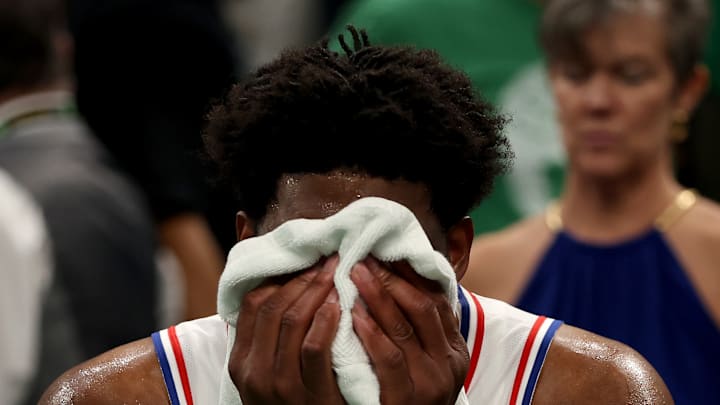Last season Kendrick Perkins stated that Philadelphia 76ers superstar Joel Embiid is the greatest center in NBA history, which seemed like blatant erasure of Houston Rockets legend Hakeem Olajuwon at the time. In case you, didn't hear...
Obviously, Embiid hasn't catapulted Olajuwon, but maybe there are some similarities, let's see. Both players are dominant centers who hail from overseas and have a similar seven-foot frame.
Both players won MVPs and racked up dominant performance after dominant performance. Both players have an array of moves on the offensive end on the floor and both are able to be dominant on the defensive floor (although Olajuwon was much more dominant on that end). That's about where it stops.
Olajuwon was an elite offensive player in the post, while Embiid operates from the nail area on the floor and shoots more 3-pointers than Olajuwon would have ever imagined (3.4 attempts over Embiid's career). This led to recent criticism from Olajuwon regarding how big men have moved away from the post, settling for more outside jumpers, specifically Embiid.
“He’s got all the moves, but leveraging the moves is different. Why would he be shooting 3s? He has the advantage every night, and if I have the advantage, I’m going to wear you out.
But 3s? “That’s settling! When I’m tired, I settle. You don’t settle when you’re trying to win. You don’t start the game settling!”
But beyond just the style of play, Embiid and Olajuwon are very different and shouldn't be pitted against each other again. It's simply a disrespect to Olajuwon. Embiid's offensive productivity has dropped off during the postseason in the last three years and in three of his first six seasons reaching the playoffs.
Why Kendrick Perkins is already regretting his Embiid praise, slight towards Rockets legend Hakeem Olajuwon
Embiid's 2022-23 campaign was a good example of this, as he averaged 33.1 points and 10.2 rebounds on 54.8 percent from the floor and 33 percent from three during the regular season, compared to 23.7 points and 9.8 rebounds on 43.1 percent from the field and 17.9 percent in the postseason.
In fact, Embiid's 9.4 point regression from the regular season to the postseason represents the largest scoring dropoff during an MVP season in league history. In case you're keeping score at home, Olajuwon averaged 27.3 points on 52.8 percent shooting in 1993-94, his MVP season, and increased that production during the 1994 postseason to the tune of 28.9 points on nearly the same efficiency (51.9 percent from the floor).
But it's the playoffs and the game mucks up and gets harder, right? Sure, but not for Olajuwon. In fact, his offensive prowess increased in each of his first five playoff appearances, and eight of his first 10 seasons.
Now, back to Embiid.
In the brightest moments, Embiid was simply a no-show for the Sixers during the 2023 postseason. Too often with the game on the line, the Sixers got their most significant moments from other players (James Harden more often than not). This was especially the case during the second-round matchup against the Boston Celtics.
It was clear that the Sixers would not have reached Game 7 were it not for James Harden turning the clock back in Games 1 and 4 (45 points and 42 points, respectively). And during Game 5, it was blatantly obvious that the Sixers' best strategy was to play through Harden down the stretch. Harden went 4-for-5 in the fourth quarter, whereas Embiid went 1-for-6 in the same period.
Embiid's heart and motor have been questioned essentially every year, and no one ever would have dared to say anything negative about Olajuwon's motor. Olajuwon reached the NBA Finals three times, winning two, while Embiid has never even been to the Conference Finals. There's a reason for that.
Embiid is also constantly injured, or limited. Since getting drafted in 2014, the Sixers center has missed 324 total games. Now, you might be thinking that's misleading, since he missed the first two seasons, but that matters alot, when it comes to comparing him to Olajuwon.
But sure, let's start in 2016, which is when he first started playing. Embiid has still missed 160 games over his "first" seven seasons. Now what about Olajuwon. The Dream missed 88 games through his first 13 seasons, and even played all 82 games on four different occasions, which Embiid has actually never done.
And let's delve into Embiid's post-game comments after his Sixers were eliminated.
“I still believe that me and (James Harden), we got the chance to win but it’s gonna take more than us. We all gotta look at ourselves. I gotta be better and I will be better. That’s what I’m focused on. All of us, we gotta come back and find ways to just keep improving and help the team.
“Can’t win alone. I can’t win alone. Me and James, we just can’t win alone. That’s why basketball is played five-on-five. So we just need everybody to just keep finding ways to get better and we’ll be fine.”
Actually, on second thought, let's not. I think we're done here. And we should be done believing that Embiid has catapulted Olajuwon, one of the greatest of all-time.
